BREAKING: Activists in Atlanta say that police are lying about what happened when a protester was shot and killed Wednesday.
The activists say police were hit with friendly fire when raiding their encampment, and that the activist killed, Tort, did not shoot them. pic.twitter.com/7U5JrkTj8k
— BreakThrough News (@BTnewsroom) January 20, 2023
Related Articles
Related Articles
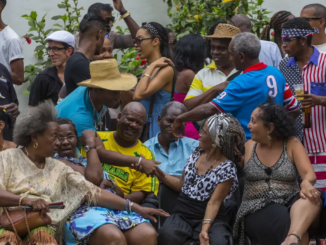
‘Anti-Black’ Claim Raised About Cuba As Solidarity Activists Stopped at U.S. Border & Black Socialists Arraigned in United States for Collaborating with Russia
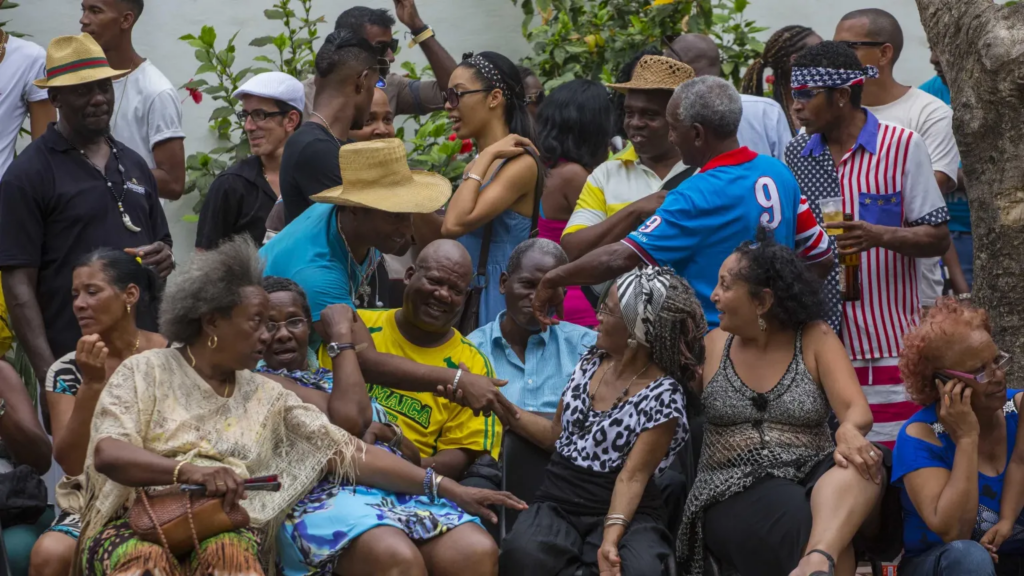
A 2-year-old argument about “anti-Blackness” in Cuba, which Black solidarity activists in the United States say has no basis in reality, has reared its head.
It appeared in a video posted on Twitter on May 1 that has since gone viral, generating more than 2 million views in four days. The video features Afro-Cuban Grecia Ordoñez, who claims Cuban Revolution leaders Fidel Castro and Ernesto “Che” Guevara were racists who engaged in “white saviorism.” She also claimed genocide was committed in the Democratic Republic of Congo during the time Cuba’s revolutionary government intervened to support rebels fighting the DRC government put in place after revolutionary leader and first Prime Minister Patrice Lumumba was assassinated in 1961. Further, she pointed to Afro-Cubans being detained in Cuba as an example of racism.
A message to black Americans from Cubans regarding Che Guevara and Fidel Castro. #Cuba🇨🇺 pic.twitter.com/kHCDnBaE6H
— Martha Bueno (@BuenoForMiami) May 1, 2023
Activists debunked her claims on Twitter, including a thread of articles and videos featuring members of anti-imperialist group Black Alliance for Peace.
For 2 years, the “anti-Blackness” claim has allowed "human rights" narratives to form around revolutionary states in the crosshairs of the U.S. empire. This video comes on the heels of one of the largest U.S. youth delegations to visit #Cuba (@PeoplesForumNYC). Here's a thread 🧵 https://t.co/oV3AhE9V0u
— Black Alliance for Peace (@Blacks4Peace) May 4, 2023
The thread included the following articles and videos:
- Hood Communist Guide to the U.S. Blockade
- Limits of Lived Experience by Erica Caines
- Out of The Clouds: Remarks on Anti- Blackness In Cuba by Salifu Mack
- Witnessing Afro Cubans and Social Change by Austin Cole
- An African Palenque: Cuba And Global Black Solidarity by Kimberly Monroe
- African Power and Politics In Cuba’s La Marina Neighborhood by Musa Springer
- Ajamu Baraka on Cuban Protests
- Afro-Cubans Against Cuba
- Black Alliance For Peace x Belly of The Beast Screening Event
- James Early and Musa Springer on Cuba, Socialism and Race
- Black August and The Cuban Revolution
While Ordoñez doesn’t point to evidence for the claim about genocide in Congo, a 2021 article in the Journal of Cold War Studies states:
“In reality, the main purpose was to crush the rebellion and secure Western interests in Congo. The intervention reflected a cavalier attitude toward sovereignty, international law, and the use of force in postcolonial Africa and had the adverse effect of discrediting humanitarian reasoning as a basis for military intervention until the end of the Cold War. The massacre of tens of thousands of Congolese in Stanleyville was a unique moment in which African countries united in their criticism of Western policies and demanded firmer sovereignty in the postcolonial world.”
Black Activists Reject Claims of Cuba’s Racism
The Black Alliance for Peace released a statement close to two years ago after protests erupted in Cuba over claims of racism. The statement, titled, “Biden’s Commitment to U.S. White Power Is the Real Race Issue in Cuba,” concludes, “We say to all those who pretend to be concerned about Cuba to demand an end to the embargo and to respect the right of the Cuban people to work through their own problems. As the first republic established on the basis of race and subsequently invented apartheid, the United States should be the last on the planet to lecture anyone on race relations.”
Activists like Asantewaa Nkrumah-Ture raised her voice against the claim that Cuba holds Black political prisoners.
“Who are ‘Black political prisoners’ in Cuba? What are their names? What organizations do they belong to & are those organizations independent of [U.S. National Endowment for Democracy] NED and [U.S. Agency for International Development] u.s. AID? Do they belong to [movement of jailed dissidents] Ladies in White? LOL, you sound more & more like Carlos Moore,” Nkrumah-Ture tweeted. Moore is an Afro-Cuban academic who wrote a 1988 book criticizing Cuban leader Fidel Castro as using racist means to grow Cuba’s influence around the world.
Who are "Black political prisoners" in Cuba? What are their names? What organizations do they belong to & are those organizations independent of NED and u.s. AID? Do they belong to Ladies in White? LOL, you sound more & more like Carlos Moore 🇨🇺
— Mawusi Ture (@MawusiTure) May 4, 2023
Further, activist and Ph.D. candidate Kimberly Miller tweeted in reply, “Are the ‘Black political prisoners’ you’re referring to leaders of San Isidro ‘movement,’ like Luis Alcántara or Denis Solís, who admittedly had members ‘who love Trump’ and directly met w/charge d’affaires at U.S. Embassy in Havana to foment regime change??”
are the “Black political prisoners” you’re referring to leaders of San Isidro ‘movement’ like Luis Alcántara or Denis Solís who admittedly had members “who love Trump” and directly met w/chargé de affaires at US Embassy in Havana to foment regime change?? https://t.co/NUpR919H9X
— Kimberly-Dawn 🇸🇩 (@ComradeKimDawn) May 5, 2023
U.S. Solidarity Activists Detained After Visit to Cuba
Meanwhile, Ordoñez’s viral video came just as the largest solidarity delegation in recent history commemorated May Day or International Workers’ Day, alongside 100,000 Havana residents representing many sectors of work. Last year’s parade drew 700,000 Cubans in Havana, as well as thousands of people who celebrated across the island. However, this year, the more-than-60-year-old U.S. blockade on Cuba has caused fuel shortages that required Cuba to cancel the parade itself and instead organize events in Havana’s neighborhoods, as Musa Springer reported on Radio Sputnik’s “By Any Means Necessary,” co-hosted by TF Board Secretary Jacqueline Luqman.
“Cubans say they are in a second Special Period,” Springer said, referring to the first Special Period that occurred after the Soviet Union dissolved in 1991, thereby causing drastic shortages of food, fuel and machinery in the 1990s. Cuba’s gross domestic product thus dropped by 35 percent in three years.
More than 1,000 foreigners from 58 countries, all representing 271 youth, labor, social and political organizations traveled into Cuba this year for the parade, as well as for an annual conference held the next day. The delegation, led by People’s Forum in New York City, included between 300 and 350 U.S.-based activists, including many young people who had never been to Cuba before. The People’s Forum tweeted that their delegation faced a second questioning behind closed doors upon their return to U.S. airports and that their digital devices had been confiscated for searches.
Upon arrival to U.S. airports, U.S. citizens and non-citizens usually line up at booths to be questioned by U.S. Customs and Border Patrol officers. Most people are allowed to continue into the United States after answering a few questions about the reason for their journey abroad. Any reason can provoke a second questioning in private, which can extend a traveler’s time inside the airport by hours.
Activist Bill Hackwell wrote in Resumen Latinoamerica English that both members of the International Peoples Assembly delegation and the LA US Hands Off Cuba Committee delegation faced a second round of interrogations, as well as device confiscations. At the time of his writing, members in those delegations had been freed.
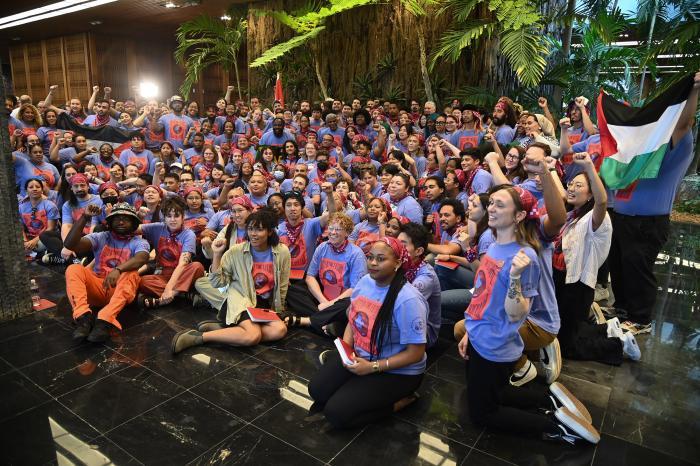
Hackwell commented on the irony by remarking on his experience in Cuba.
“What I have seen this past week is a government here more concerned about the well-being of the next generation of U.S. youth than their own government that marginalizes them by constricting access to jobs with a living wage, that makes access to education nearly impossible without the burden of student loans that they will carry for years, and that incarcerates them at a rate like no other country in the world.”
Manolo De Los Santos, executive director of the People’s Forum, thanked the Cuban people for their solidarity.
“These unfortunate incidents are further evidence of the wrong direction of a hostile U.S. foreign policy towards Cuba,” De Los Santos concluded in the tweet. “Their actions in fact demonstrate that the U.S. is far from a bastion of democracy and human rights, and rather than intimidate us, they motivate us to strengthen our struggles for true, transformative change here in the United States.”
🇨🇺✊🏽 After hours of harassment & interrogation, all the comrades who traveled to Cuba are FREE! Thanks for all the love & solidarity received from throughout the world!!
The aggressive attitude of the Customs & Border Patrol officials towards the members of our delegation during…
— Manolo De Los Santos (@manolo_realengo) May 4, 2023
Cuban President Miguel Díaz-Canel Bermúdez expressed his solidarity with the detained activists.
“Cheer up guys, we’re with you. Thank you for your courage, for supporting #Cuba and for facing the hatred of those who cannot stand the fact that the Cuban Revolution has the support of the most progressive youth in the very bowels of the beast. We send you a big hug.”
Ánimo, muchachos, estamos con ustedes. Gracias por la valentía, por apoyar a #Cuba y por enfrentar en las propias entrañas del monstruo el odio de quienes no pueden soportar que la Revolución Cubana tenga el apoyo de los jóvenes más progresistas. Les mandamos un fuerte abrazo. https://t.co/N6K2H92CaX
— Miguel Díaz-Canel Bermúdez (@DiazCanelB) May 4, 2023
U.S. Government Attacks Black Socialists
Meanwhile, the Hands Off Uhuru campaign announced via email to the press that on Tuesday, May 2, African People’s Socialist Party Chairman Omali Yeshitela and African People’s Solidarity Committee Chairwoman Penny Hess appeared in federal court in Tampa, Florida, in response to the U.S. Dept. of Justice’s April 18 indictment. The Black socialist group is accused of allegedly attempting to “sow discord” in the United States with the support of Russia.
Yeshitela, an 81-year-old Black man, and Hess, a white woman active in the movement since 1976, were “booked, restrained with handcuffs and leg irons, and held in a cell for several hours before appearing before a judge who released them on conditional bond that included a requirement to hand over their passports.
On Monday, May 8, Uhuru Solidarity Movement Chair Jesse Nevel will appear in response to the same indictment.
The group has asked the public to donate to the “Hands Off Uhuru! Hands Off Africa! Defense Fund” to help cover their legal fees.
Background information about this indictment can be found in a recent Toward Freedom article. If found guilty, the accused face up to 15 years in prison.
Julie Varughese is editor of Toward Freedom.
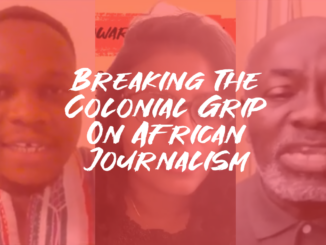
VIDEO: Breaking the Colonial Grip on African Journalism
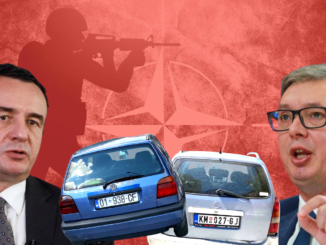
NATO Wades Into License Plate Dispute Between Serbia and Kosovo

KOSOVSKA MITROVICA, Kosovo—A fight over license plates in the Balkans has gotten the North Atlantic Treaty Organization (NATO) involved.
Posters and graffiti can be seen throughout the Serbian-dominated part of the town of Kosovska Mitrovica in northern Kosovo that say, “No surrender—Serbian license plates and ID remain.”
Despite the European Union moderating bilateral talks, ethnically Albanian-dominated authorities in Pristina, Kosovo’s capital, plan on September 1 to re-register vehicles featuring Serbian plates. However, recent protests jammed up border crossings between Kosovo and Serbia. Plus, a poll shows the majority of Kosovo-based Serbs plan to continue using Serbian-issued license plates.
“They will certainly provide resistance if Pristina attempts to ‘nationalize’ thousands of cars if their owners refuse to replace Serbian-issued license plates with Kosovan ones,” said Milica Andric Rakic. The project manager of Kosovska Mitrovica-based non-governmental organization New Social Initiative told Toward Freedom that Serbs may bow to a certain degree to pressure from Belgrade, but will not accept ultimatums from Pristina.
This dispute comes amid Serbia’s resistance to the European Union’s and the United States’ pressure to recognize the 2008 secession of Kosovo. But, as Serbian President Aleksandar Vucic recently pointed out, both entities refuse to acknowledge breakaway republics in Ukraine’s Donbass region.
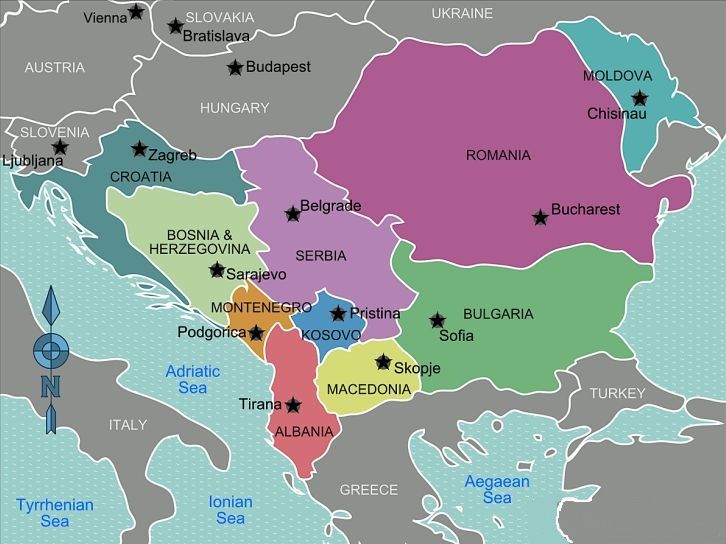
Serbia-Kosovo Relations
Following the 1999 NATO bombing of Serbia, the Serbian police and army were forced to withdraw from the country’s southern province, Kosovo. Then NATO troops entered Kosovo in June 1999, having remained since. Nine years later, Pristina declared independence, a move recognized by most Western countries. In southern Kosovo, ethnic Albanians make up over 90 percent of the population.
Serbia’s defeat, however, did not mark the end of the presence of Serbian institutions in Kosovo. In the north, as well as in certain places in the south, Serbs make up the majority of the population. Despite the secession, Serbia has continued issuing license plates and identification cards (IDs) to Serbs living in northern Kosovo.
“For Kosovo’s Prime Minister Albin Kurti, those car plates are illegal,” Rakic said. “But for the local Serbs, they are the only ones they have.”
She said Serbs do not want to integrate into Kosovo’s legal and political system, despite occasional pressure that comes from Belgrade. For them, Kosovo is part of Serbia. That is Belgrade’s official position, too.
However, amid Western pressure over the years, Serbia has had to make concessions to Kosovo. For example, in 2011, Serbia agreed to create de facto border crossings with Kosovo, while Serbian police officers were integrated into the Kosovo police force. In 2013, Belgrade called on Serbs living in northern Kosovo to take part in Pristina-run local elections. Two years later, Serbia’s judicial authorities in northern Kosovo were integrated into the Kosovo legal framework.
“The Serbs in northern Kosovo never supported such actions. That is why Belgrade was always either ‘bribing’ them or pressuring them to integrate into Kosovo’s institutions,” Rakic said, referring to various deals Belgrade has offered Serbs over the years to de-escalate the situation.
‘New Generation Will Not Put Up with Terror’
Serbian President Aleksandar Vucic expressed solidarity with ordinary Serbians at an August 17 joint press conference with NATO Secretary General Jens Stoltenberg.
“A new generation of young men in northern Kosovo will not put up with the terror that comes from Pristina,” Vucic said.
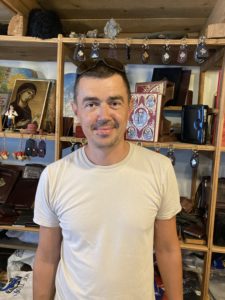
But, Sinisa Radovic, who owns a small souvenir shop in Kosovska Mitrovica, said he has no choice but to re-register his vehicle.
“Otherwise, they will confiscate it. Right now, if I drive a car with Serbian-issued plates south of Kosovska Mitrovica, the police can fine me and I would have to pay 250 euros,” Radovic explained.
In northern Kosovo, drivers have used stickers to cover Serbian state symbols on license plates. It is a temporary solution to the dispute.
On August 18 in Brussels, Vucic and Kurti failed to reach a deal, although EU High Representative for Foreign Policy and Security Josep Borrell claimed they have until September 1 to resolve the burning issue.
Kosovo Prime Minister Albin Kurti has stated Serbian license plates are considered illegal. Rakic said it’s possible Kosovo’s authorities will force Serbs into Kosovo’s legal system without an agreement with Serbia.
“Such an attempt will undoubtedly lead to an escalation,” she pointed out.
‘Pristina Will Have a Big Problem’
Moreover, Pristina now requires Serbs living in northern Kosovo to replace their Serbian-issued identification cards with Kosovo documents.
Some challenges Serbians in Kosovo face are that Pristina neither recognizes Serbian-issued driver’s licenses nor Serbian-issued IDs.
Some Serbians hold Kosovo’s IDs, while others cannot get them for technical reasons. In order to apply for a Kosovo ID, one would have to attach a birth certificate. Serbians living in Kosovo would want a Kosovo-issued ID to be able to get Kosovo-issued driver’s licenses and plates to be allowed to drive south of the Serbian-dominated areas. Plus, to get paid by a Kosovo-based employer, they would need a Kosovo ID to be able to open bank accounts to receive direct paycheck deposits.
“But Pristina does not recognize birth certificates issued by Serbia’s authorities after June 1999, which means that someone who was born in Kosovska Mitrovica in 2000 does not legally exist for Pristina and cannot even apply for an ID,” Rakic explained.
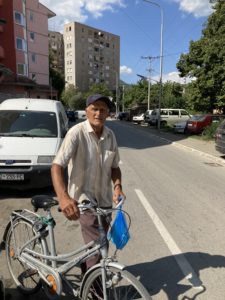
Yet, some holdouts remain. One of them is local pensioner Mirko Trajkovic.
“This is Serbia. Why should I have any documents issued by illegal institutions in Pristina?” Trajkovic said, adding Belgrade will not betray Serbs in northern Kosovo.
This reporter found it difficult to find many Serbs who would comment. Many fear both the Serbian and Kosovo governments would retaliate.
Neither Belgrade nor Pristina effectively control northern Kosovo. The territory is a “gray zone,” where NATO’s Kosovo Force (KFOR) mission is expected to intervene in case of potential clashes between Serbs and the Albanian-dominated Kosovo Security Forces.
Meanwhile, panic has spread on social media and in Western media. Plus, the Kosovo prime minister speculated about an escalation leading to a new war in the Balkans.
Rakic thinks that’s unlikely, though. But she did suggest one possibility: Because Kosovo has rejected all Serbian proposals for a resolution, what could happen if no deal is reached by September 1 is Belgrade may call on the Serbian community in the north to boycott Kosovo-issued documents and license plates.
“Then Pristina will have a big problem, since it is logistically very difficult to confiscate thousands of vehicles.”
Nikola Mikovic is a Serbia-based contributor to CGTN, Global Comment, Byline Times, Informed Comment, and World Geostrategic Insights, among other publications. He is a geopolitical analyst for KJ Reports and Enquire.
